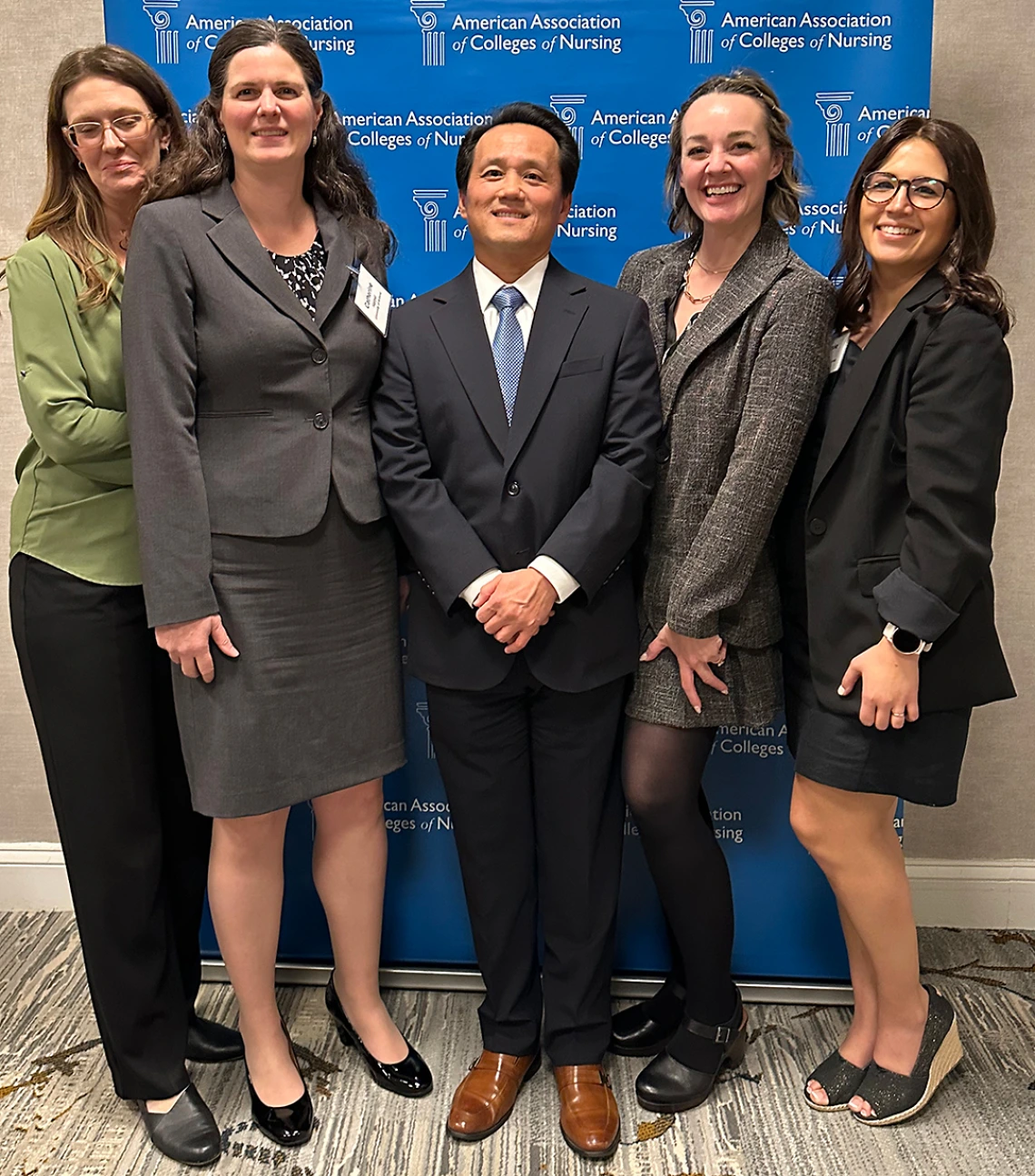Empowered to Lead: Jonas Scholars tackle national nursing issues

L to R: Jacquelyn Martin, Catherine Harpst, Dean Ahn, Stephanie Lapsley, and Stefanie Boyles
Three exceptional Jonas Scholars from the College of Nursing—Stefanie Boyles (’27), Stephanie Lapsley (’27), and Jacquelyn Martin (’26) – all current PhD students – represented the college at the 2025 Student Policy Summit, hosted by the American Association of Colleges of Nursing (AACN) in Washington, D.C., this March. They were joined by fellow PhD student Catherine Harpst (’27), the recipient of the AACN 2025 Future Nurse Leader Scholarship, and were accompanied by College of Nursing Dean Brian Ahn, PhD. Notably, the University of Arizona is the only institution in the nation with three Jonas Scholars in the 2024–26 cohort.
Since its inception in 2008, the Jonas Scholars program has been pivotal in addressing the national nursing faculty shortage. The program offers high-potential doctoral nursing students financial assistance, mentorship, leadership development, and networking opportunities. Upon completing the cohort, graduates can qualify for a potential $6,000 award if they accept a faculty position.
Boyles explains, “What sets this experience apart is the caliber of mentorship and the sense of community it fosters. As a Jonas Scholar, I’ve gained access to a national network of brilliant, mission-driven nurse scholars and leaders. This support system has expanded my perspective, opened doors for meaningful collaboration, and deepened my commitment to advancing change in nursing and maternal health by equipping me with tools, confidence, and connections.”
The AACN Student Policy Summit immersed Boyles, Lapsley, Martin, and Harpst in federal policymaking, emphasizing nurses' crucial role in shaping healthcare legislation. Throughout the two-day conference, they interacted with leading policy experts and AACN staff, acquiring essential advocacy skills to tackle pressing issues in academic nursing.
“At the Jonas conference, I was struck by the breadth and vast scope of nursing science, which spans many critical areas, from environmental health to healthcare policy and beyond,” says Lapsley. “The conference opened my eyes to the incredible potential for discovery and innovation within the field. I now see that the sky is the limit regarding my research. Whether it’s exploring new care models, addressing health disparities, or advancing nursing education, the possibilities are endless. This expansive view has inspired me to think bigger and aim higher in my research endeavors.”
A key highlight of their trip was meeting with U.S. Senators Mark Kelly and Ruben Gallego of Arizona staff to discuss current issues affecting nursing education and the profession. Each scholar contributed a unique perspective based on their area of research. The conversation covered the need for sustained funding for nursing workforce development programs, which is crucial in addressing Arizona’s nursing shortage.
They discussed challenges securing clinical placements for nursing students and considered supporting preceptors, experienced nurses who mentor students. The group also highlighted how federal student aid programs like the Public Service Loan Forgiveness Program and Pell Grants make nursing education more accessible, along with the role of the National Institute of Nursing Research (NINR) in connecting education to research and driving innovation in care.
Martin stated, “It was very powerful to have the three major universities in Arizona — U of A, ASU, and NAU — meet with the Senators' staff and advocate for nursing education and research funding. The Senators were open to working with nurses for policy changes that support the robust education of nurses and the advancement of nursing science through NINR research funding.”
Each scholar presented on their academic interests. Boyles emphasized the importance of maternal care and reproductive health. Lapsley discussed how environmental factors, like water quality, impact public health. Martin focused on community health initiatives for underserved populations, particularly Latinos. Harpst addressed the need to connect nursing research with practical patient applications.
Given the challenges in nursing education, the timing of their discussion is crucial. Recent data shows a 3.1% decline in PhD program enrollment and a 0.9% drop in master’s programs despite an increase in Bachelor of Science in Nursing (BSN) enrollments. These trends raise concerns about future faculty shortages, as master’s and above graduates are typically qualified to teach at the university level. It's essential to find ways to address these gaps and ensure a strong pipeline of nursing educators and leaders for the future.
Dean Ahn reflected on the experience, “Our Jonas and Leadership scholars exemplify the passion and dedication required to drive meaningful change in nursing education and healthcare policy. Their presence at the Student Policy Summit highlights the University of Arizona College of Nursing’s commitment to preparing leaders who will shape the profession's future.”
As they return to Arizona, Boyles, Lapsley, Martin, and Harpst bring invaluable insights, a strengthened resolve, and a renewed commitment to advocating for the nursing profession. Their participation in the Summit elevated the reputation of the University of Arizona College of Nursing. It reinforced nurses' essential role in influencing healthcare policy at the highest levels.
Lapsley states, “The College of Nursing has a prestigious PhD program that I was drawn to after researching its curriculum and faculty. My advisor, Dr. Rutherford, and Dean Ahn, have supported my education and experiences, helping me secure opportunities like the Jonas Scholars program and joining the Environmental Health Research Institute for Nurse and Clinician Scientists (EHRI-NCS) fellowship, where my focus on environmental health is fostered. Having supportive faculty and advisors is essential for growth.”
The experiences of these four remarkable scholars at the Student Policy Summit reflect their individual passion and academic excellence and the strength of the College of Nursing’s PhD program. Their journey underscores the vital importance of investing in nursing education, research, and leadership and affirms the college’s role in cultivating the next generation of change agents in the profession.

